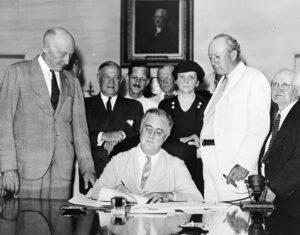By Charles Hoffacker
You’re never going to step out of the front door into the kingdom of God. What you’re going to do is slowly and painfully change society until it has more of the values that emanate from the teaching of Jesus or from the other great religious leaders.
-Tommy Douglas
People in the United States keep looking to Canada as an example of a country with an exemplary model of universal health care. In a recent column, Ralph Nader identified 25 ways in which the Canadian system is superior to the current American system. According to Nader, “No health insurance system is without problems but Canadian-style single-payer–full Medicare for all–is simple, affordable, comprehensive and universal.” The Canadian system is “everybody in, nobody out, free choice of doctor and hospital.” An equivalent system in the United States “will produce far less anxiety, dread, and fear.”
National health insurance for Americans was removed from consideration during the legislative process that eventually produced the Social Security Act of 1935. The fault lay not with major proponents of the bill such as President Franklin Roosevelt or Labor Secretary Frances Perkins, but with the American Medical Association, which on this issue functioned as a special interest group for the medical profession, demanding that doctors control how care would be provided. Generations later, Americans still lack universal health care. We look to Canada with respect and perhaps envy because their universal health care system is firmly established as a national asset of which Canadians are understandably proud.
The outstanding figure in the establishment of the Canadian system was Tommy Douglas (1904-86), a prairie politician and Social Gospel minister. Although largely unknown in the United States, Douglas is remembered with deep appreciation in Canada. One of his last great speeches, given at the 1983 New Democratic Party convention, was met with a standing ovation that lasted twenty-three minutes. In a 2004 CBC Television competition, he was voted “The Greatest Canadian of All Time.”
By the end of his long career in politics, Douglas had served as a Member of Parliament, the premier of Saskatchewan for seventeen years, and the founding leader of the New Democratic Party. The Saskatchewan provincial health care plan introduced during his premiership became the basis for the current Canadian system; in both developments Douglas had a pivotal role.
How did Douglas become an extraordinary leader? Personal experiences, public events, and religious faith were among the factors, as they were with Frances Perkins. Born in Scotland, Douglas immigrated to Canada as a child, where a pair of early crises–one personal, one public–contributed to the formation of his social conscience.
For several years Douglas suffered from recurrent osteomyelitis in his right leg, which resulted in lengthy hospitalizations. Finally his doctors recommended that young Tommy’s leg be amputated. Then it happened that Dr. R. J. Smith, a renowned orthopedic surgeon, was leading students through the public wards of the hospital and took an interest in Tommy’s case. The Douglas family could not afford the services of this specialist, so Dr. Smith took on the case for free, with the understanding that the boy would be used as a teaching case. Several operations later, Tommy Douglas was healed.
Thus an idea was planted in the mind of the future politician. He said later, “I always felt a great debt of gratitude to [Dr. Smith} but it left me with this feeling that if I hadn’t been so fortunate as to have this doctor offer me his services gratis, I would probably have lost my leg . . . I felt that no boy should have to depend either for his leg or his life upon the ability of his parents to raise enough money to bring a first-class surgeon to his bedside. And I think it was out of this experience . . . I came to believe that health services ought not to have a price-tag on them, and that people should be able to get whatever health services they required irrespective of their individual ability to pay.”
As a teenager in Winnipeg, Douglas witnessed the largest-ever strike in Canadian history. In 1919, the cost of living had risen far faster than wages had. Workers in the building trades went on strike, and were soon joined by others, including police officers, streetcar workers, and telephone operators. By May 15, the city was shut down, with some 22,000 to 35,000 people on strike out of a population of 200,000.
The labor conflict came to a head on “Bloody Saturday,” June 21, when large numbers of strikers assembled for a peaceful demonstration in front of Winnipeg City Hall. Then the Royal North West Mounted Police appeared on horseback, together with a force of “special constables,” striker breakers hired, at twice the usual pay, to replace the 240 regular officers who remained loyal to the strike. Mounties fired revolvers and charged the crowd with clubs. The “special constables” attacked with hoe handles and baseball bats. Strikers scattered, and soon the army gained control over downtown Winnipeg. Within several days, the strike collapsed.
Together with friends, Tommy Douglas watched the Bloody Saturday confrontation from a rooftop. It became a searing, transformative event in his life comparable to what the Triangle Shirtwaist Fire was for Frances Perkins. Douglas later declared, “Whenever the powers that be can’t get what they want, they’re always prepared to resort to violence or any sort of hooliganism to break the back of organized opposition.” Thus he came to see the world from the perspective of ordinary people standing up for themselves. As his biographer Vincent Lam observed, “Though he was to rise to a position of considerable influence, Tommy’s allegiance remained always with the protester in the street rather than the Mountie who charged strikers on horseback.”
At an early age, Douglas worked as a printer, boxed competitively, and began to develop what became his remarkable talent as a public speaker. The center of his social life was Beulah Baptist Church in Winnipeg, where he attended worship and participated in other activities several times a week.
The basis for Tommy Douglas’ political perspective was the Social Gospel movement, a radical stream of thought popular in progressive churches in Canada, the United States, and elsewhere. Douglas biographers Thomas H. McLeod and Ian McLeod offer a definition of the Social Gospel: “This movement expressed anger at existing conditions, but it also carried the hope, prevalent through the industrial nations, that people working in the service of God could shape a new world.”
Anticipating ordination, Douglas enrolled in the theology program at Brandon College in 1924 and went on to serve two churches in Saskatchewan. Tommy was pastor of Calvary Baptist Church in Weyburn, an agricultural community, when the Stock Market Crash of 1929 took place. The price of grain collapsed, businesses were shuttered, loans were called in, and family farms foreclosed. The entire province was economically devastated. In response to this disaster, the basement of Calvary Baptist Church became a relief office and employment agency, donations to people in need were distributed generously, and the pastor appeared before town councils advocating on behalf of the poor.
Gradually a network emerged that included pastors, teachers, doctors, labor leaders, co-op organizers, and other concerned citizens. They realized that charitable efforts went only so far in addressing the consequences of many years of unrestrained capitalism. Joined by others, the network became the Co-operative Commonwealth Federation (CCF). Douglas was a leader in this political party and later founded its successor, the New Democratic Party (NDP), which continues to be a force in Canadian politics.
Douglas came to recognize social activism as an essential and growing part of his vocation as a preacher and pastor. Denouncing injustice and advocating for the oppressed was, in his view, part of God’s work in the world. His congregation supported him, and he simply ignored his critics elsewhere. Years later, Allan Blakeney, a successor of Douglas as premier of Saskatchewan, observed that when Douglas entered politics, “he didn’t change his message, he changed his pulpit.”
Frances Perkins, social worker and cabinet secretary, and Tommy Douglas, preacher and politician, were both driven by their Christian faith to serve in public office in order to address the human needs they recognized in their societies. Their traditions of Christianity were different, but sought similar results. Perkins was a high church Episcopalian who emphasized Christ’s Incarnation and his sacraments and looked for Jesus in the face of every person, while Douglas was a Social Gospel Baptist whose faithful reading of the Bible inspired him to work cooperatively for the coming of God’s kingdom on earth.
As Americans struggle for a health care system supportive of human dignity, we would do well to recognize the examples of those who labored in this field before us, including our own Frances Perkins and Canada’s Tommy Douglas.
The Rev. Charles Hoffacker is a priest of the Episcopal Church and a board member of the Frances Perkins Center.
Further reading
Canadian Council of Churches, Charter and Covenant: The Churches and the Struggle for Public Health Care in Canada. Available at https://www.councilofchurches.ca/wp-content/uploads/2013/12/health_gunn_charter_and_covenant.pdf
Vincent Lam, Tommy Douglas. Penguin Group, 2011. This accessible biography by a Canadian physician is one volume in the Extraordinary Canadians series.
Thomas H. McLeod and Ian McLeod, Tommy Douglas: The Road to Jerusalem. Hurtig Publishers, 1987. This definitive biography is the work of a long-time Douglas associate and his journalist son.


